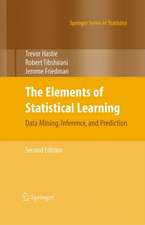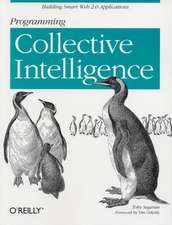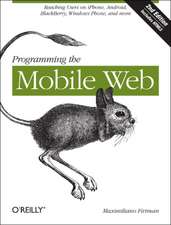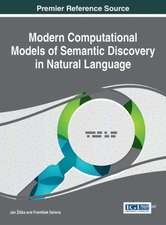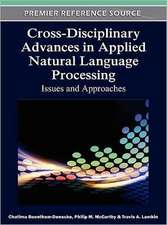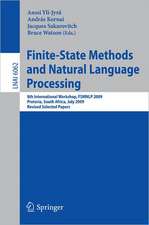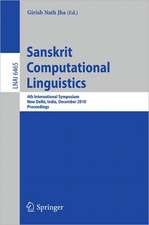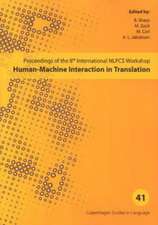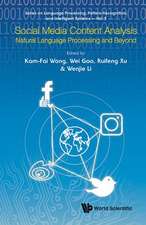Integration of World Knowledge for Natural Language Understanding: Atlantis Thinking Machines, cartea 3
Autor Ekaterina Ovchinnikovaen Limba Engleză Paperback – 20 apr 2014
| Toate formatele și edițiile | Preț | Express |
|---|---|---|
| Paperback (1) | 643.83 lei 6-8 săpt. | |
| ATLANTIS PRESS – 20 apr 2014 | 643.83 lei 6-8 săpt. | |
| Hardback (1) | 648.44 lei 6-8 săpt. | |
| ATLANTIS PRESS – 17 feb 2012 | 648.44 lei 6-8 săpt. |
Preț: 643.83 lei
Preț vechi: 804.78 lei
-20% Nou
Puncte Express: 966
Preț estimativ în valută:
123.20€ • 131.74$ • 102.72£
123.20€ • 131.74$ • 102.72£
Carte tipărită la comandă
Livrare economică 18 aprilie-02 mai
Preluare comenzi: 021 569.72.76
Specificații
ISBN-13: 9789462390393
ISBN-10: 9462390398
Pagini: 260
Ilustrații: XVII, 242 p. 16 illus., 2 illus. in color.
Dimensiuni: 155 x 235 x 14 mm
Greutate: 0.37 kg
Ediția:2012
Editura: ATLANTIS PRESS
Colecția Atlantis Press
Seria Atlantis Thinking Machines
Locul publicării:Paris, Netherlands
ISBN-10: 9462390398
Pagini: 260
Ilustrații: XVII, 242 p. 16 illus., 2 illus. in color.
Dimensiuni: 155 x 235 x 14 mm
Greutate: 0.37 kg
Ediția:2012
Editura: ATLANTIS PRESS
Colecția Atlantis Press
Seria Atlantis Thinking Machines
Locul publicării:Paris, Netherlands
Public țintă
GraduateCuprins
Preliminaries.- Natural Language Understanding and World Knowledge.- Sources of World Knowledge.- Reasoning for Natural Language Understanding.- Knowledge Base Construction.- Ensuring Consistency.- Abductive Reasoning with the Integrative Knowledge Base.- Evaluation.- Conclusion.
Textul de pe ultima copertă
This book concerns non-linguistic knowledge required to perform computational natural language understanding (NLU). The main objective of the book is to show that inference-based NLU has the potential for practical large scale applications.
First, an introduction to research areas relevant for NLU is given. We review approaches to linguistic meaning, explore knowledge resources, describe semantic parsers, and compare two main forms of inference: deduction and abduction.
In the main part of the book, we propose an integrative knowledge base combining lexical-semantic, ontological, and distributional knowledge. A particular attention is payed to ensuring its consistency. We then design a reasoning procedure able to make use of the large scale knowledge base. We experiment both with a deduction-based NLU system and with an abductive reasoner. For evaluation, we use three different NLU tasks: recognizing textual entailment, semantic role labeling, and interpretation of noun dependencies.
First, an introduction to research areas relevant for NLU is given. We review approaches to linguistic meaning, explore knowledge resources, describe semantic parsers, and compare two main forms of inference: deduction and abduction.
In the main part of the book, we propose an integrative knowledge base combining lexical-semantic, ontological, and distributional knowledge. A particular attention is payed to ensuring its consistency. We then design a reasoning procedure able to make use of the large scale knowledge base. We experiment both with a deduction-based NLU system and with an abductive reasoner. For evaluation, we use three different NLU tasks: recognizing textual entailment, semantic role labeling, and interpretation of noun dependencies.
Caracteristici
The detailed introduction to computational natural language understanding (NLU) helps the reader to obtain background knowledge necessary to perform practical NLU The chapter on knowledge base construction shows how to obtain structured knowledge applicable to practical NLU from existing freely available knowledge resources Includes a new algorithm for debugging inconsistent ontologies and a new methodology for ensuring conceptual consistency Shows how heterogeneous knowledge can be employed in one single reasoning pipeline Suggests practical application scenarios of the proposed approach Includes supplementary material: sn.pub/extras









